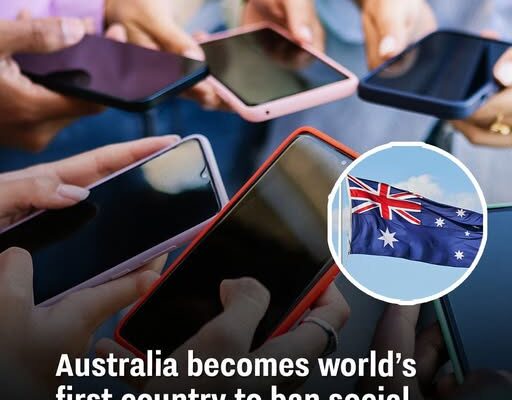

December 3, 2024
Australia To Become First Country to Ban Social Media to Anyone Under 16
In a groundbreaking move, Australia is set to enforce the world’s strictest social media regulations by banning users under 16 from accessing platforms such as Instagram, Snapchat, TikTok, and others. The legislation, passed with a significant majority in Parliament, positions Australia as the first country to impose such a comprehensive age restriction, sparking a global debate on the balance between safeguarding youth and preserving digital freedoms.
Justification for the Ban

Prime Minister Anthony Albanese emphasized that the ban aims to combat the rising mental health crisis among young Australians, which he linked directly to social media use. “This is a global problem, and we want young Australians to have a childhood,” Albanese stated, highlighting the growing concerns from parents and mental health advocates. The government cited studies and anecdotes about how platforms have become tools for bullying, anxiety, and harmful algorithms, which perpetuate body image issues and self-esteem problems among teenagers.
Support for the social media ban has been strong among Australian parents. A recent YouGov poll revealed that 77% of Australians back the measure, signaling widespread approval of tighter regulations on social media platforms. Communications Minister Michelle Rowland added, “Platforms now have a social responsibility to ensure the safety of our kids is a priority for them.”
Despite these intentions, critics have raised concerns about the lack of detail in how the ban will be implemented. The use of biometric age-verification technology, a cornerstone of enforcement plans, has sparked privacy fears, with warnings of potential misuse of personal data.
Divided Opinions

While many parents and advocacy groups have hailed the legislation as overdue, critics argue that the policy may inadvertently harm vulnerable groups, such as LGBTQIA+ teens and migrants, who often rely on social media for community and support. Tereza Hussein, a 14-year-old refugee in Darwin, shared, “Social media is my lifeline to my grandmother and friends back home. Losing it would leave me feeling isolated”.
Youth advocates have also criticized the government for excluding young voices in shaping the bill. The eSafety Youth Council, which advises on digital regulation, expressed concerns that banning social media outright may push teenagers into unregulated and potentially more harmful corners of the internet. Amnesty International warned, “A ban that isolates young people will not meet the government’s objective of improving lives”.
Moreover, major tech companies like Meta, TikTok, and Snap have voiced their disapproval. Meta’s spokesperson criticized the rushed legislative process, arguing that existing safeguards already address many concerns. Snap Inc. echoed these sentiments, saying, “There are still many unanswered questions about how this law will be implemented in practice”.
Implementations and Implications

Scheduled to take effect in late 2025, the ban grants tech companies one year to develop systems to prevent underage social media access. Platforms that fail to comply face fines of up to AUD $50 million. However, critics have pointed out the ease with which teenagers can circumvent restrictions using VPNs, making enforcement a significant challenge.
Globally, this policy has drawn attention. Countries like France and some U.S. states have implemented or considered age restrictions, but none have gone as far as Australia. The UK has hinted at similar measures, with its technology secretary recently stating that such a ban could be “on the table”.
Despite the challenges, Albanese remains resolute, stating, “We don’t argue that its implementation will be perfect… but we know it’s the right thing to do.” The law reflects Australia’s growing trend of holding tech giants accountable, following earlier legislation mandating platforms to pay for news content.
The social media ban marks a significant step in addressing concerns about the impact of digital platforms on mental health and well-being. While the intentions are commendable, the execution faces scrutiny over privacy, inclusivity, and effectiveness. As the world watches, the success or failure of this bold policy could shape future global approaches to regulating Big Tech.



